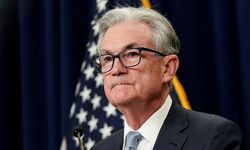Germany's gross domestic product, known as Europe's leading economy, is expected to fall by 0.6 percent compared to other forecasts.
The institutes emphasized that the main reason for this negative development was the weak performance of consumption and industrial production and lowered their spring forecast by 0.9 percentage points.
THE ONLY COUNTRY AMONG MAJOR INDUSTRIALIZED COUNTRIES TO EXPERIENCE A RECESSION
Beyond the International Monetary Fund's (IMF) forecast of a 0.3 percent decline, Germany, the EU's leading economy, stands out as the only one of the major industrialized countries to experience a recession this year.
Oliver Holtemöller, an economist at the Halle Institute for Economic Research (IWH), said that while Germany has been in recession for more than a year, the impact of the rise in energy prices on the economy after Russia's war of occupation of Ukraine stands out.
The European Central Bank has been aggressively raising interest rates since July 2022, while inflation exceeding 8 percent has also negatively affected the purchasing power of the people.
But in Germany, wage increases offsetting inflation and falling energy prices will help the economy recover at the end of the year and lead to improved production capacity utilization levels, according to the institutes.
The institutes expect the German economy to recover by 1.3 percent in 2024. In the medium term, however, experts warn that economic developments in China and trade conflicts between the EU and China could pose threats to German exports.
Germany has recently faced an economic and industrial downturn, which is also affecting the political debate. The government of Olaf Scholz has a coalition of Social Democrats, Greens and Liberals holding the economic portfolio as it works to tackle these economic challenges.
A big disappointment in Germany!
According to reports from Germany's leading economic research institutes, the country's economic prospects for 2023 have been disappointingly downgraded.
Trending news

Snoop Dogg to carry the Olympic torch

Lily James Expresses Admiration for Hailey Bieber’s Rhode Skincare Line

Taylor Tomlinson Will Explore Her Faith and Sexuality on Tour!

'Alien mummy' in Peru raises eyebrows

Scandal in the heart of Europe: Child abuse in a church!

Kamala Harris’ Running Mate: Here’s Who Could Be Her VP After Biden Drops Out And Endorses Her









